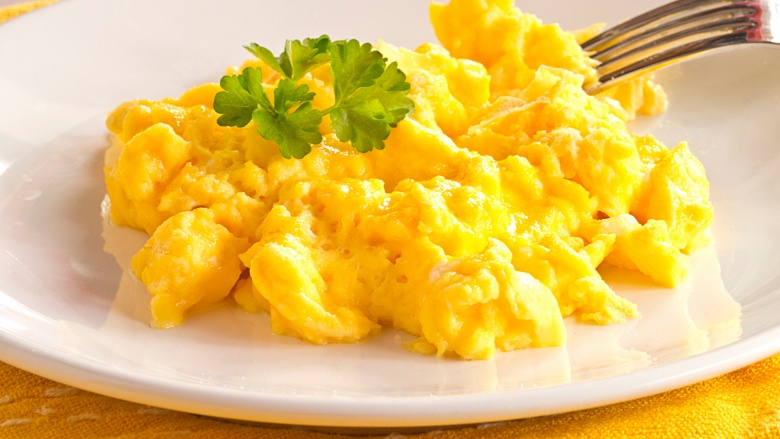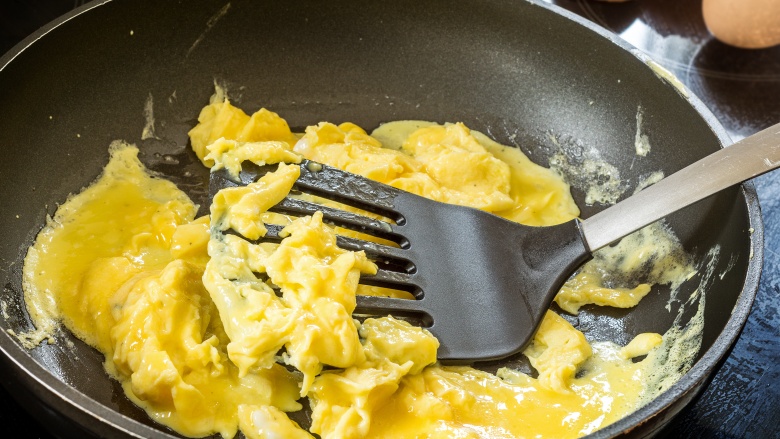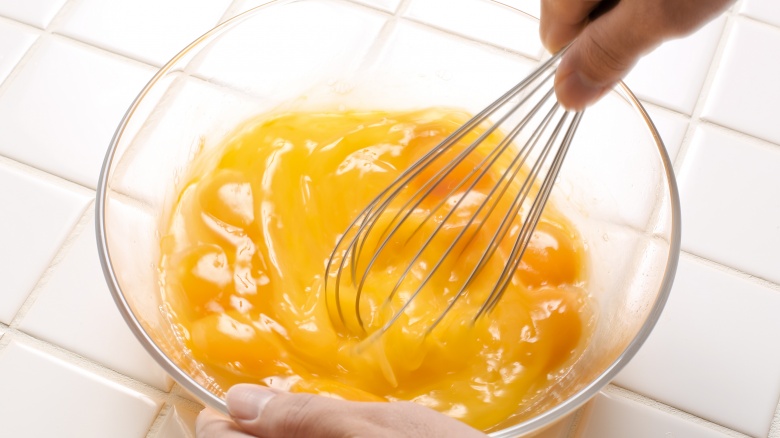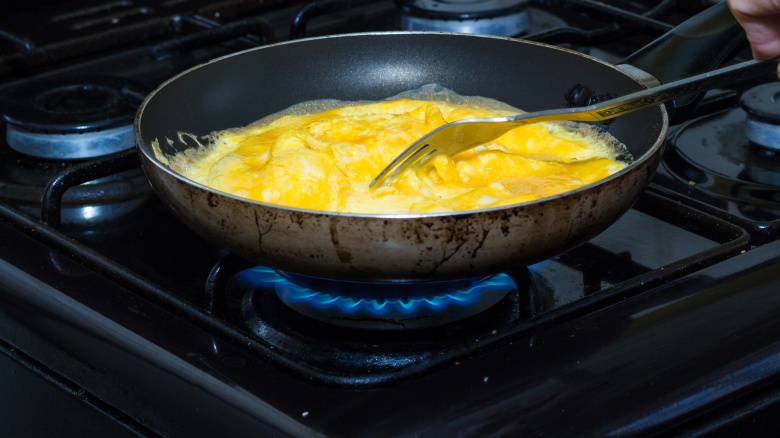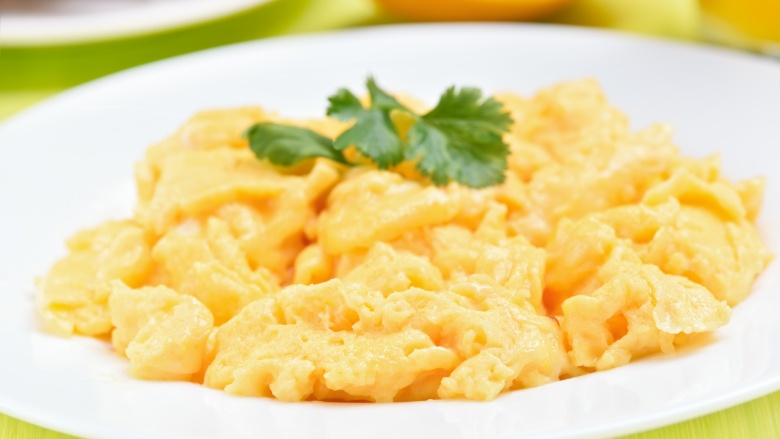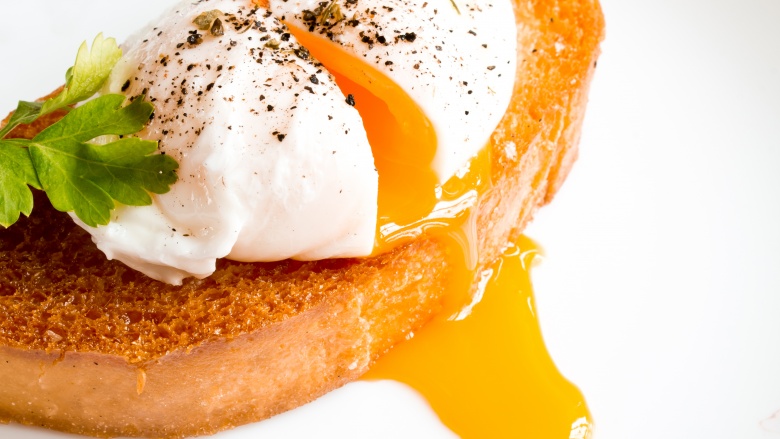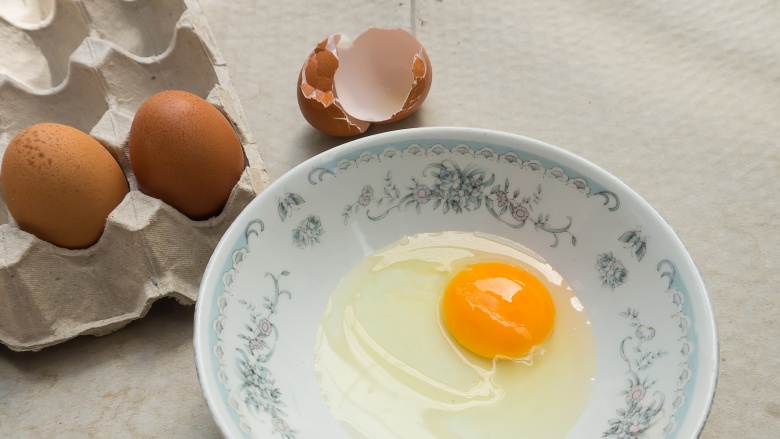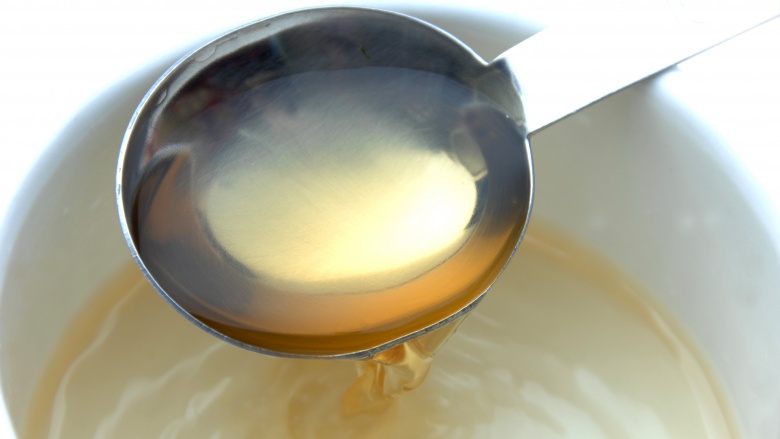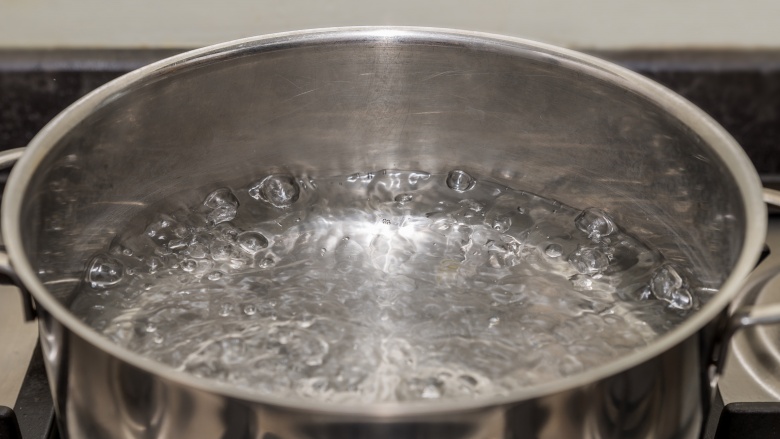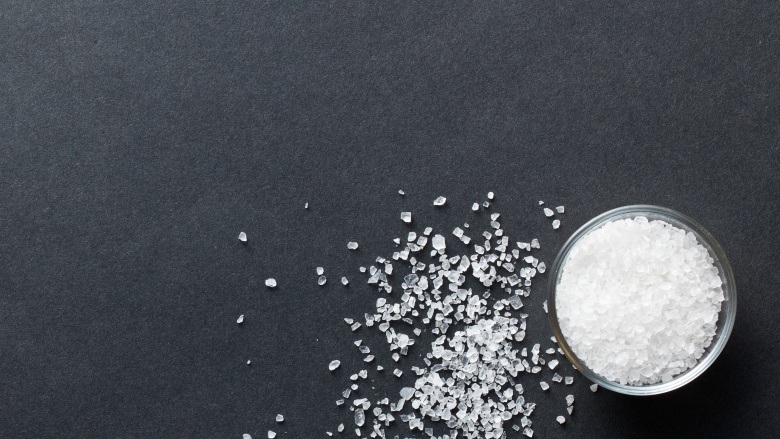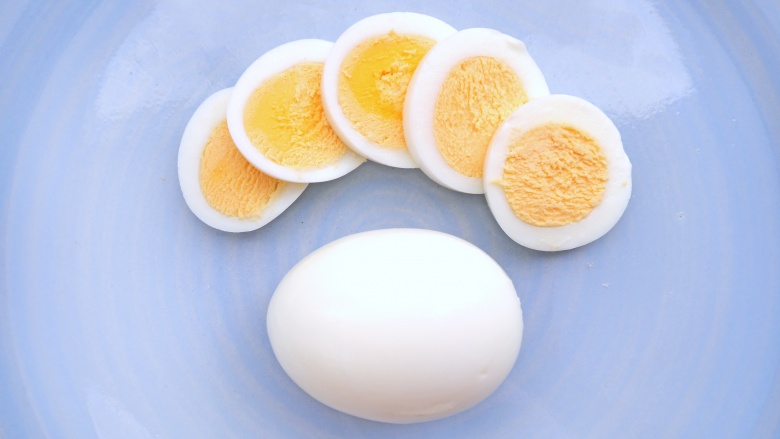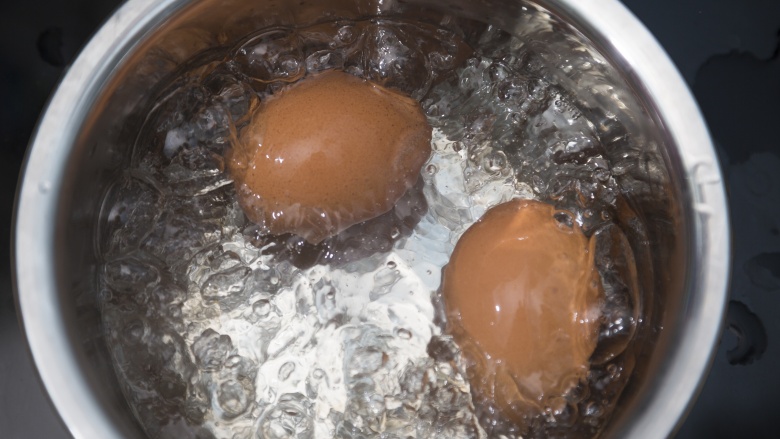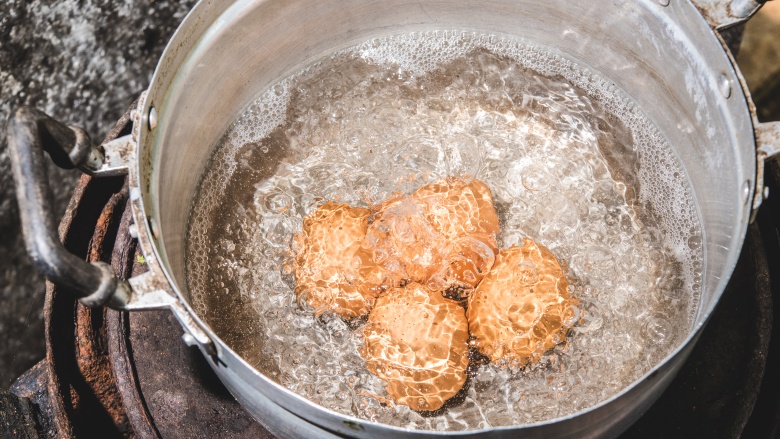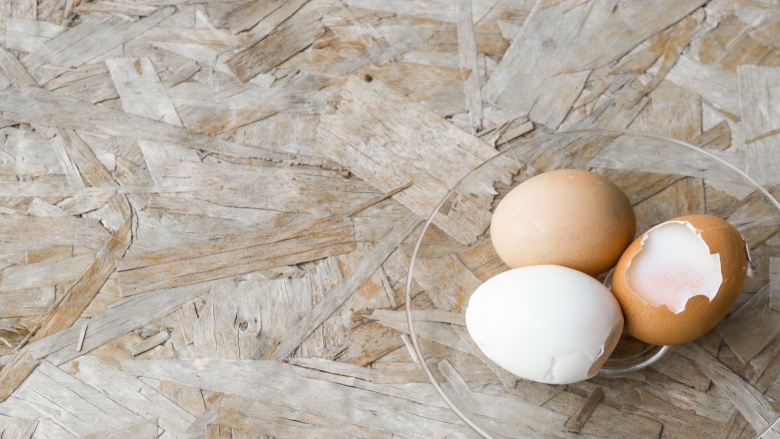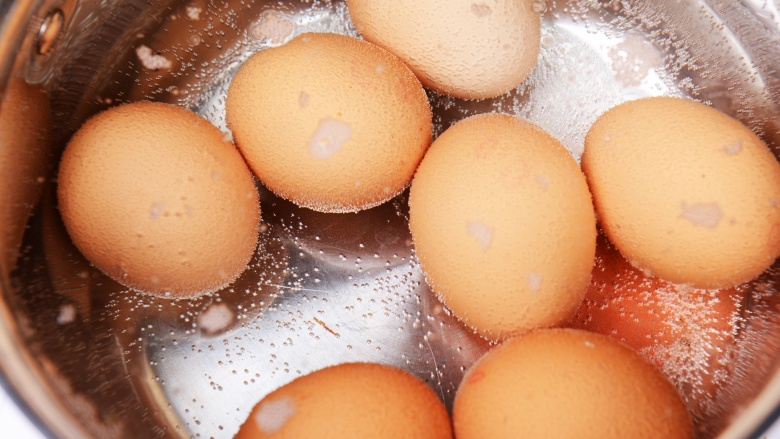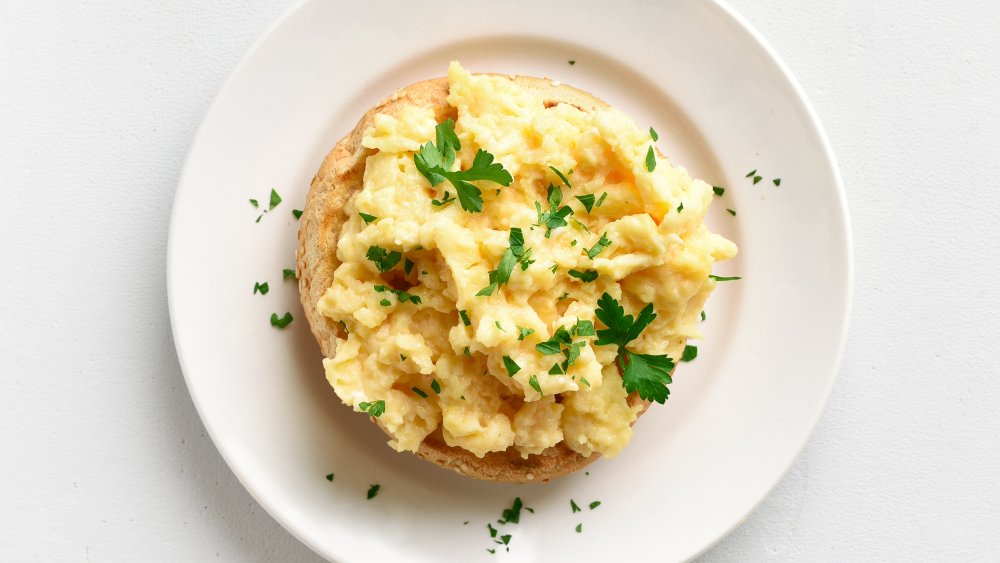15 Mistakes Everyone Makes When Cooking Eggs
Humble smooth orbs, eggs are a magical food that — lucky for us — are readily available by the dozen. An excellent source of protein and other essential vitamins and minerals, each egg is a self-contained food miracle. A staple breakfast ingredient in many households, eggs can be prepared in any number of ways. From softly scrambled and delicately poached to efficiently hard-boiled, the options are abundant.
Cooking eggs is deceptively simple. While they seem almost childishly easy to cook, they can be finicky to deal with. You're best served by knowing a few tricks of the trade to avoid rubbery eggs that make you feel forlorn. Here is a guide to help prevent the common (but needless) crimes committed against promising egg dishes.
Scrambled eggs: Using a cast-iron skillet
Scrambled eggs are an easy go-to on busy mornings when you want to love your breakfast, cut down on food prep time, and feel full until lunch. With their soft curds and rich flavor, it's no wonder this egg preparation gets so much love. They are easy to make and just as easy to mess up. Avoid a few common mistakes and you'll find yourself enjoying creamy, fluffy eggs on all the days. Say goodbye to dry and spongy, and holler "hello!" to soft and glorious.
One big mistake? Do not use a cast-iron skillet to cook scrambled eggs — like, not even in a pinch. It's not worth it. Your eggs will stick to the pan like crazy, leaving about a third of the mixture inedible and glued to the bottom. Whether you're making scrambled eggs or a loaded omelet, always use a nonstick pan to avoid messy cleanup and distressing waste.
Speaking of omelets, making one should be in the repertoire of any good cook. So let's crack some eggs and learn to make a classic omelet recipe that will take breakfast to the next level.
Scrambled eggs: Cooking the eggs over high heat
Eggs cook surprisingly quickly, so you never want to prepare scrambled eggs over high heat. Doing so is a guaranteed way to find yourself reluctantly eating eggs that are dry as all get out. Preheat your pan over medium heat and reduce it to medium-low once you add the eggs. Cooking over moderately low heat allows you to control the rate at which your eggs cook, while helping them to cook evenly.
Scrambled egg aficionado Keith Kamikawa opts for a medium heat with his "the best scrambled eggs recipe." It doesn't take long for eggs to cook and as Kamikawa noted "the eggs will keep cooking and stiffening after the heat is off," so high heat isn't necessary.
Scrambled eggs: Scrambling the eggs in the pan
This dish is easy enough as it is, so don't even think about cracking the eggs directly into the pan to save a dish or perceived time. Yes, yes, your logic tells you that you can just scramble them in the pan and everything will be okay. And it might work, but it won't be okay. This so-called shortcut will result in unattractive, streaky eggs that are unevenly mixed. Go ahead and use that extra bowl. Mix your eggs well before adding them to the pan.
Scrambled eggs: Not moving the eggs around in the pan
Since eggs cook so fast, you want to move them around in the pan to create billowy curds. Leaving them there on the heat untouched while you do something else means a crust will form quickly on the bottom. By definition, crusts are dry. You definitely don't want dry scrambled eggs. Is there any worse fate for scrambled eggs? Spoiler alert: there is not.
Scrambled eggs: Letting the eggs overcook in the still-hot pan when it's off the heat
Carryover cooking is a reality to keep in mind. The pan from your eggs will remain hot for some time after you remove it from the heat source, so you don't want to leave them in there after they've finished cooking. The residual heat from the pan will continue cooking the eggs, effectively drying them out. As soon as your eggs are done, transfer them to a bowl or plate. If you're not serving them immediately, cover them loosely with foil to keep warm.
Poached eggs: Using less-than-fresh eggs
Poached eggs are beautiful to behold but they can be challenging to make at first. Their delicate texture and near-perfect form are big draws — not to mention the allure of their bright yellow, ridiculously sexy, oozing yolks. There's no need to relegate this egg preparation to the realm of fancy restaurant brunches anymore. By steering clear of a handful of common mistakes, you can enjoy eggs Benedict in your home whenever you want.
The older the eggs, the more the whites thin out and become less viscous. In turn, poaching old eggs causes the whites to separate into streaky strands that muddle the water. You want to use fresh eggs when you're poaching so the whites stay cohesive, resulting in finished products that hold together.
Poached eggs: Adding the eggs directly into the water
Poaching eggs requires a light hand, a gentle touch. You want to avoid cracking the eggs directly into the water so that you can exercise more control over their entry. Pro tip: Crack them into small, shallow bowls and ease them into the water from there. There should be zero splash and some degree of finesse.
Poached eggs: Adding the vinegar to the pot before adding the egg
Many recipes call for vinegar in the cooking water before the eggs are added. While you may want the acidity to hasten the rate at which your eggs cook, they tend to hold together better when the small amount of vinegar is added to the eggs themselves before putting them into the water. The contact is less dispersed and more concentrated. Try it!
Poached eggs: Adding the egg to water that's too hot or too cold
The temperature of your water matters a lot when you poach eggs. If your water is at a full boil, it is much too hot and will cause streaks of the egg whites to break off. If the water is not hot enough, you'll notice the whites and the yolks separating altogether. The key is to ease your eggs into the water when it is at a gentle simmer — meaning that some small bubbles are noticeable right below the surface of the water but it's not roiling.
Poached eggs: Seasoning the water
Since you salt water to cook everything else — spaghetti, potatoes, etc. — you may be tempted to do the same when you poach eggs. Don't do it! Salt breaks down food, which is why you want its presence to soften pasta and hearty vegetables. You don't want it to break down the whites in the eggs when you add them to the water. Just the opposite: You need those whites to stay together. Save the seasoning for when the eggs are finished cooking.
Boiled eggs: Adding the eggs to hot water
Boiled eggs are simple, unadorned beauties that can sometimes be underrated. But honestly, they are perfect for so many things. Creamy egg salad? Check. Zesty deviled eggs come brunch hour? Check. Crusty tartine topping? Check. And they're delectable all alone with a sprinkling of flaky sea salt and freshly ground black pepper. Learn these tips and you'll quickly become obsessed with boiled eggs.
People commonly add their eggs to the cooking water once it has boiled. This is a natural move that seems right since we often add other ingredients to boiling water. However, cold eggs from the refrigerator are more likely to crack when put into direct contact with hot water. To avoid this, gently place the eggs in the empty pot, then cover the eggs with cold water.
Boiled eggs: Letting the eggs cook at a boil the entire time
Allowing the eggs to cook the entire time in boiling water is a surefire way to overcook them. To avoid the disturbing gray yolks of overcooked eggs, be sure to remove the pot from the heat once the water boils. Even off the heat, the water remains plenty hot, gently cooking your eggs. Let them sit in the water for about 10 minutes for hard-boiled eggs and about 5 minutes for soft-boiled results.
Perhaps you're looking for a good use for a pot full of hard-boiled eggs? You're in luck, because you'll want to make this egg salad recipe again and again.
Boiled eggs: Leaving the eggs in the hot water for too long after removing the pot from the heat
Boiled eggs require attention. If you leave your eggs in the hot water for too long after turning off the heat, the eggs will cook beyond the soft-boiled or hard-boiled stage and become sad, rubbery little things. Set a timer depending on how cooked you prefer your eggs, and using a slotted spoon, immediately remove them from the hot water when the timer goes off.
Boiled eggs: Peeling the eggs before they've cooled down
While it may be tempting to immediately peel your eggs once they're finished cooking, wait a little. The cooling time allows for the egg to separate from the shell slightly, making the peeling process less like a massacre. If you're like most people, you have been impatient before and ended up with large chunks of egg stuck to the shell. No need to cue the sad violin, just wait a few minutes!
Boiled eggs: Crowding too many eggs in the pot
Maybe you want to boil a large batch of eggs for the rest of the week. Perhaps your bigger pot is in the dishwasher. Whatever the reason, some people try to boil way too many eggs at once in a pot that's too small. Avoid overcrowding whenever possible. Since most stoves heat a little unevenly, putting too many eggs in close proximity increases the likelihood of uneven cooking. There's no room for the little guys to move around! They might even have head-on collisions and crack. Yikes.
Scrambled eggs: Using milk
It's a little bit of age-old wisdom, right? Everyone's heard that you should add a bit of milk to your scrambled eggs to make them just so much better, but we found that's not the case. Like, at all.
Rather than definitely making your scrambled eggs better, adding milk can do some other stuff — and none of it's good. Not only is it going to tone down that distinctive "eggy" taste, but it's going to change the texture. You run the risk of making your eggs too runny and seriously, is there anything more disgusting than runny scrambled eggs? It's also going to have a pretty negative impact on the color of your eggs, and instead of that bright, vibrant yellow-orange, you're going to get something that's ... well, we'll say it. It looks like snot. Add in the possible texture ramifications and it's no wonder a lot of people just can't stomach scrambled eggs.
If you absolutely have to add something, try adding in a dash of butter toward the end of cooking. You'll cut down on the rubbery-ness, and you'll avoid all the grossness that can come with milk.

